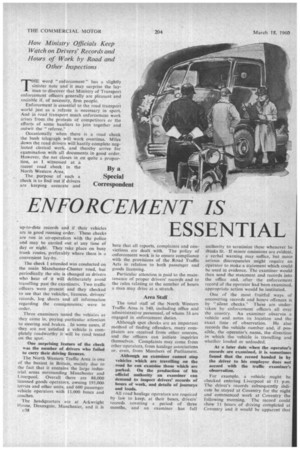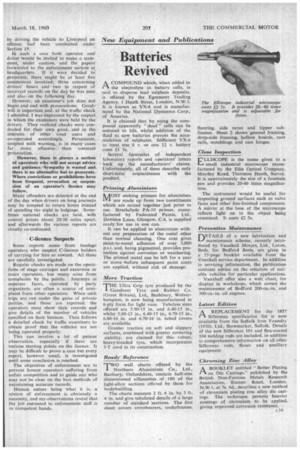ENFORCEMENT IS ESSENTIAL
Page 74

Page 75

If you've noticed an error in this article please click here to report it so we can fix it.
How Ministry Officials Keep Watch on Drivers' Records and Hours of Work by Road and Other Inspections By a Special Correspondent
THE word " enforcement " has a slightly sinister note and it may surprise the layman to discover that Ministry of Transport enforcement officers generally are pleasant and sociable if, of necessity, firm people.
Enforcement is essential to the road transport world just as a referee is necessary in sport. And in road transport much enforcement work arises from the protests of competitors or the efforts of some hauliers to join together and outwit the " referee."
Occasionally when there is a road check the bush telegraph will work overtime. Miles down the road drivers will hastily complete neglected clerical work, and thereby arrive for examination with all documents in good order. However, the net closes in on quite a proportion, as I witnessed at a recent road check in the North Western Area, The purpose of such a check is to find out if drivers are keeping accurate and up-to-date records and if their vehicles are in good running order. These checks are run in co-operation with the police and may be carried out at any time of day or night. They take place on busy trunk routes, preferably where there is a convenient lay-by.
The check I attended was conducted on the main Manchester-Chester road, but periodically the site is changed as drivers who hear of it will deliberately avoid travelling past the examiners. Two traffic officers were present and they checked to see that the vehicles, licences, drivers' records, log sheets and all information regarding the consignments; were in order.
Three examiners tested the vehicles as they came in, paying particular attention to steering and brakes. In some cases, if they are not satisfied a vehicle is completely roadworthy it will be road tested on the spot.
One surprising feature of the check was the number of drivers who failed to carry their driving licences.
The North Western Traffic Area is one of the busiest in Britain, mainly due to the fact that it contains the large industrial areas surrounding Manchester and Liverpool. Overall there are 88,000 licensed goods operators, owning 195,000 lorries and other units, and 600 passenger vehicle operators with 11,000 buses and coaches.
The headquarters are at Arkwright House, Deansgate, Manchester, and it is c38 here that all reports, complaints and convictions are dealt with. The policy of enforcement work is to ensure compliance with the provisions of the Road Traffic Acts in relation to both passenger and goods licensing.
Particular attention is paid to the maintenance of proper drivers' records and to the rules relating to the number of hours a man may drive at a stretch.
Area Staff
The total staff of the North Western Traffic Area is 340, including office and administrative personnel, of whom 33 are engaged in enforcement duties.
Although spot checks are an important method of finding offenders, many com plaints are received from other sources, and the officers can initiate inquiries themselves. Complaints may come from other operators, from haulage associations or, even, from Members of Parliament.
Although an examiner cannot stop vehicles which are travelling on the road he can examine those which are parked. On the production of his official authority an examiner can demand to inspect drivers' records of hours of work, and details of journeys and loads.
All road haulage operators are required by law to keep, at their bases, drivers' records covering a period of three months, and an examiner has full authority to scrutinize these whenever he thinks fit. If minor omissions are evident, a verbal warning may suffice, but more serious discrepancies might require an operator to make a statement which could be used in evidence. The examiner would then send the statement and records into the office and, after the enforcement record of the operator had been examined, appropriate action would be instituted.
One of the most fruitful ways of uncovering records and hours offences is by "silent checks." These are undertaken by enforcement officers all over the country. An examiner observes a vehicle and notes its location and the exact time of observation. He also records the vehicle number and, if possible, the operator's name, the direction in which the vehicle is travelling and whether loaded or unloaded.
At a later date when the operator's records are examined, it is sometimes found that the record handed in by the driver to his employer does not accord with the traffic examiner's observation.
For example, a vehicle might be checked entering Liverpool at 11 p.m. The driver's records subsequently indicate he stayed at Coventry for the night and commenced work at Coventry the following morning. The record could show 11 hours of driving completed at Coventry and it would be apparent that by driving the vehicle to Liverpool an offence had been committed under SectiOn 19.. •. In such a case both operator and' driVer would be invited to make a statement, under caution, and the papers forwarded to the, enforcement section at headquarters. If it vvere decided to prosecute, there mightbe at least five summonses involved; threeconcerning drivers' hours and two-in respect of incorrect records on the day he was seen and also On the following day.
However, an examiner's j013 does not begin and end with prosecutions, Good-. will is important and, at the traffic check I attended, I was impressed by the respect in which the examiners were held by the drivers. They realized checks were conducted for their own good, and in the. interests of other road users and co-operated accordingly. Persuasion, coupled with warning, is in many cases far more effective than constant
prosecution. • .
However, there is always _a .section. of operators who -will not aceept advice and guidance.--Sympathy is wasted and. there is no alternative but to prosecute. Where convictions or prohibitions have been frequent, revocation or suspension of an operator's licence may follow.
Many offenders are detected at the end of the day when drivers on Icing journeys may be tempted to return home instead of spending the night in lodgings. Sometimes national checks are held, with control points about 20-30 miles apart, and afterwards the various reports are closely co-ordinated.
C-licence Suspects Some reports come from haulage operators who suspect C-licence holders of carrying for hire or reward. All these are carefully investigated.
Regular checks are made on the operations of stage carriages and excursion Or tours operators, but many arise from complaints by the public. Journeys at separate fares, operated by party organizers, are often a source of complaint from other operators. When Well trips are run under the guise of private parties, and these are reported, the operators must show their records and give details of the number of vehicles specified on their licences, Then follows a detailed check by traffic examiners to obtain proof that the vehicles are not being operated properly.
This can involve a lot of patient observation, especially if there are various starting points on the licence. It may be difficult to prove a case but every report, however small, is investigated until some conclusion is reached.
The objectives of enforcement 'are to prevent honest operators suffering from unfair competition and to guide any who may not he clear on the hest methods of maintaining accurate records.
Human nature being what it is, a system of enforcement is obviously a necessity, and mrobservations reveal that the job entrusted to enforcement staff is in competent hands.
























































































































